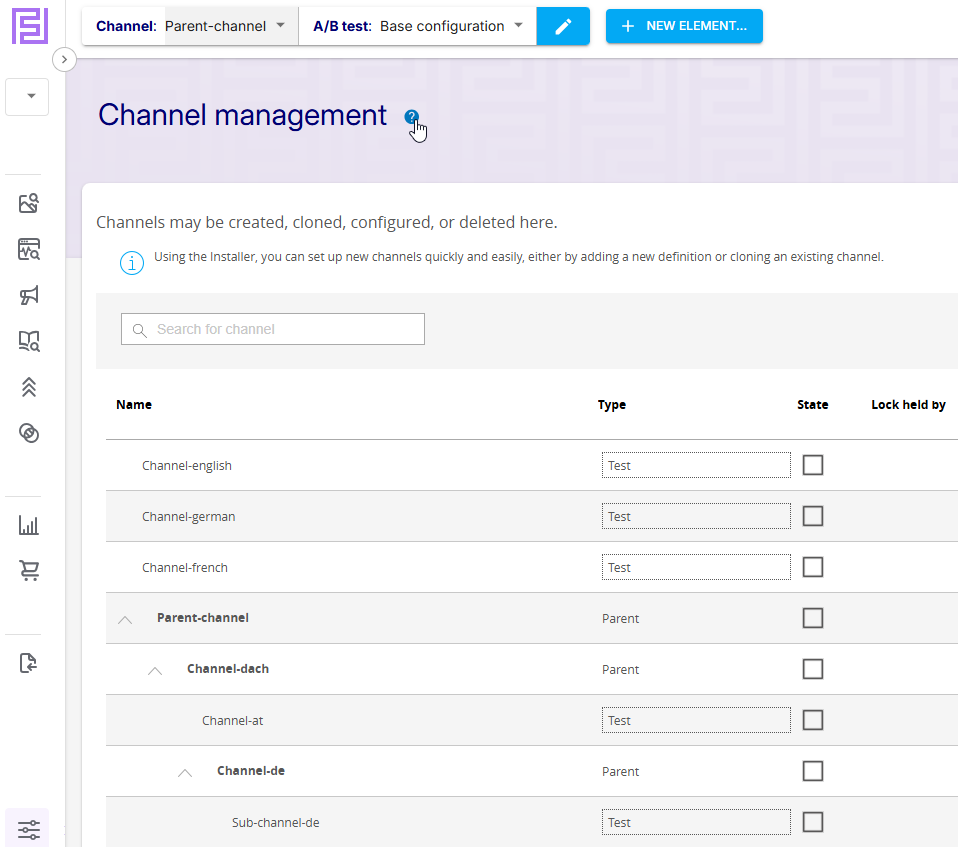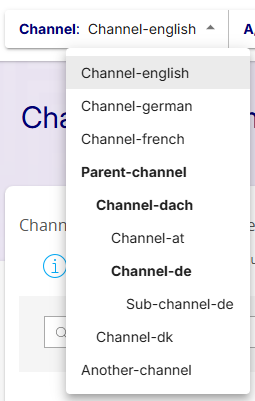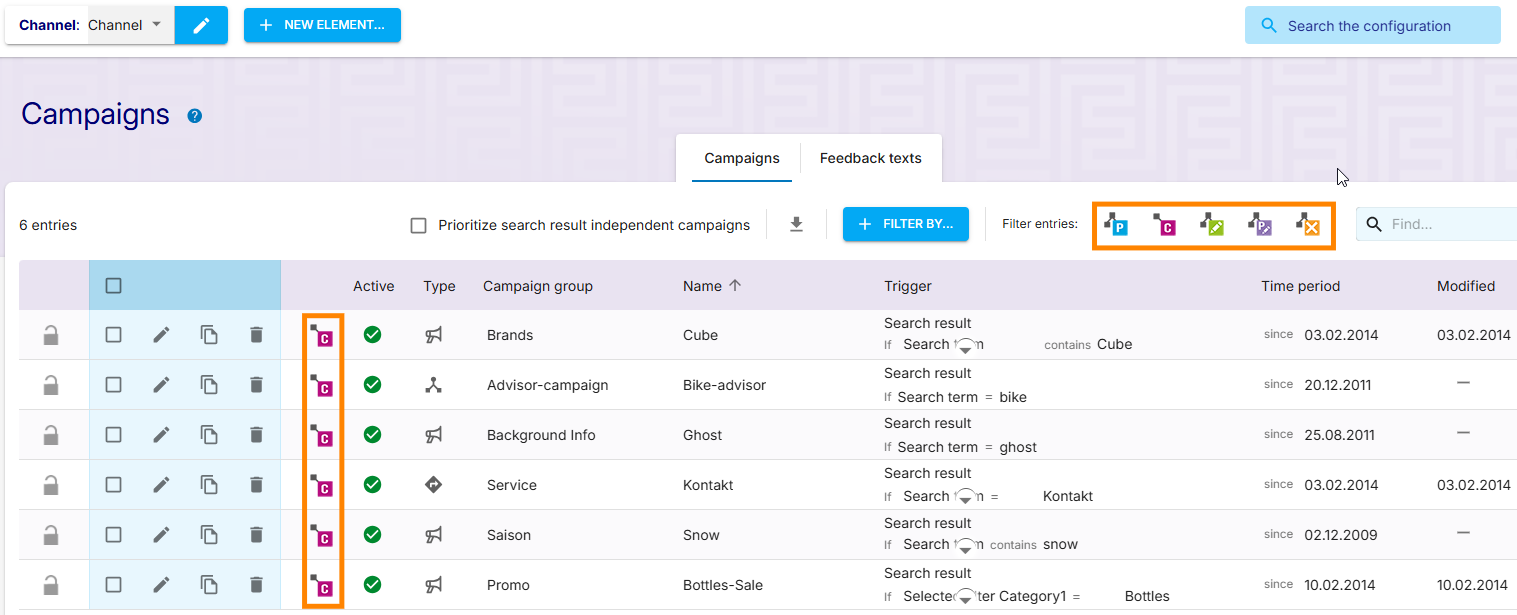Summary
This page explains how to manage settings across multiple channels using the Parent and Child channels functionality:
relationship between parent and child channels
how settings are inherited
how to customize these settings for specific child channels
Relation between Parent and Child Channels
Parent Channel - is a primary channel whose settings can be passed down to other channels.
Child Channel - is a secondary channel set up to inherit settings from a designated parent channel. Only child channels can inherit settings.
Relations between parent and child channels are governed by a few simple rules:
Parent to Child Flow: Setting changes made in a parent channel are automatically passed down (inherited) by its child channels.
One-way Inheritance: Any settings changed in a child channel do not carry over to the parent channel.
Inherited settings can still be customized: All settings inherited by a child channel can be customized individually for each child channel. This allows adjustments for specific needs, like country-specific behaviour or language differences, while retaining baseline settings from the parent.
Child channel customization can be reverted to parent channel defaults: Any customized setting in a child channel can be reverted back to inherit the current setting from its parent channel.
Identifying Parent and Child Channels
Parent and Child Channels in Channel Editing
Parent and child channels are grouped together in hierarchical order.
Parent channel can be easily identified by Type.

Parent and Child Channels in Channel Selection
Just like in the installer, parent and child channels are also displayed in groups in the channel selection.
Child channels are indented slightly and grouped under their parent.

Child Channels in Edit View
When editing settings within a child channel for functions that support multi-channel inheritance, unique icons will appear next to the settings to indicate their inheritance status.
![]()
Working with Inherited Settings in Child Channels
Only child channels can inherit settings. All Multi-Channel compatible functions will inherit the parent channel's settings.
Multi-Channel Symbols
If a child channel is selected in one of Multi-Channel compatible functions, all of its settings will be tagged with special symbols. These symbols are only used for and therefore only visible in child channels.

The Multi-Channel symbols ![]() appear in one of two constellations:
appear in one of two constellations:
Above a list of settings: allows you to filter the list for inherited, customized, new or deleted settings.
Next to individual settings: denotes the status of the setting (inherited, customized, deleted) and allows for customization within the child channel.
Symbol | Displayed above Settings | Displayed next to Settings |
|---|---|---|
| Show all settings inherited from parent channel. Click: Hide all settings inherited from parent channel. | This setting was inherited from the parent channel. Click: customize setting in the child channel. |
| Show all settings customized for the child channel. Click: Hide all settings customized for the child channel. | This setting was customized for the child channel. Click: Reset setting to inherited version. |
| Show all settings deleted in the child channel. Click: Hide all settings deleted in the child channel.. | This setting was deleted in the child channel. Click: Reset setting to inherited version. |
| Show all settings created for the child channel. Click: Hide all settings created for the child channel. | This setting was newly created in the child channel. Click: No effect. |
| Show all settings customized for the child channel. Click: Hide all settings partially for the child channel. |
Customizing inherited settings
Initially, all settings a child channel inherits are locked. To customize them:
Select the desired child channel and ensure configuration editing is enabled
Find the setting to be customized and make sure it is tagged with the
 symbol. If it isn't, the setting is not inherited, but has been modified before.
symbol. If it isn't, the setting is not inherited, but has been modified before.Click the
 symbol. It should turn into a
symbol. It should turn into a  symbol. Customization is available now
symbol. Customization is available now
The customized setting is now exempt from inheritance. Any changes made to the parent channel will only carry over, if the setting is reset to the inherited version.
Deleting inherited settings
This option is only available for functions, which allow the deletion of entries. For example in the settings for the Search algorithm, inherited settings can only be customized or reset, not deleted.
To delete an inherited setting for the currently active child channel, follow these steps:
Select the desired child channel and ensure configuration editing is enabled
Find the setting to be deleted and make sure it is tagged with the
 symbol. If it isn't, the setting is not inherited, but has been modified before.
symbol. If it isn't, the setting is not inherited, but has been modified before.Click the
 symbol on the right. The
symbol on the right. The  will change into a
will change into a  symbol and the setting in question will be struck out.
symbol and the setting in question will be struck out.
The customized setting is now exempt from inheritance. Any changes made to the parent channel will only carry over, if the setting is reset to the inherited version.
Resetting to an inherited version
Any customized or deleted setting is now exempt from inheritance. To revert it and reset to the inherited version:
Select the desired child channel and ensure configuration editing is enabled
Find the setting you wish to customize and make sure it is tagged with the
 or
or  symbol (otherwise it is an inherited setting).
symbol (otherwise it is an inherited setting).Clicking the
 or
or  symbol, or alternatively, click
symbol, or alternatively, click  . After confirmation in the pop-up dialogue, the setting will be reset to the
. After confirmation in the pop-up dialogue, the setting will be reset to the  symbol.
symbol.
The edited setting is now again inherited from the parent channel. Any changes made to the setting in the parent channel will carry over to the child channel.
Adding new setting to a Child Channel
Some functions (e.g. Thesaurus, Preprocessor, Stop Words, etc.) allow you to add new settings for child channels. These are exempt from inheritance and tagged with a  symbol.
symbol.
List of Inherited Settings
Function | Configuration can be inherited? | Comments |
|---|---|---|
Search Optimization | ||
Thesaurus | Create rules for synonyms(similar words) and antonyms(anti-synonyms). These words/expressions will be added to the query. | |
Preprocessor | Create rules for word replacements - these words will replace the ones originally in the query. | |
Stop Words | Curate a list of words that should be ignored by the search (e.g. a, an, the). | |
Recycle Bin | Has to be manually adjusted as it depends on search terms and through that on linguistic idiosyncrasies. | |
Basic Settings | ||
Search Algorithm | Set the minimum similarity, the bandwidth (maximum difference between best and worst result), speed vs quality and search timeout. | |
Field Prioritization | Add, import and edit fields | |
Ranking | Please note that sales numbers (topsellers) may differ between countries. Unchanged ranking rules might not always be applicable. | |
Filter/Navigation | ||
ASN-Previews | ||
Result Listing | ||
Index Fields | Please check for divergent combi-fields (i.e. manufacturer + product name). | |
Import Settings | ||
Suggest | ||
Suggest Logic | ||
Suggest Types | ||
Suggest Import | ||
Suggest Whitelist | Does not carry over between different languages. | |
Suggest Blacklist | Does not carry over between different languages. | |
Module | ||
ASO | ||
Personalisation | Might have to make country specific adjustment, depending on settings. | |
SEO-Enhancer | ||
Single Word Search | ||
Semantic Enhancer | ||
Data Quality | ||
Recommendations | ||
Campaigns | ||

